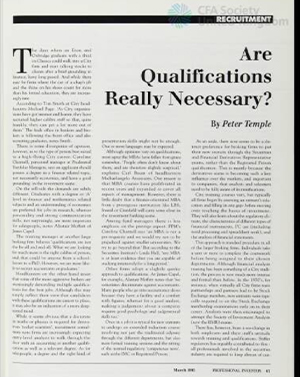
The days when an Eton and Oxbridge graduate with a third class degree in Classics could walk into the City of London are long over, even in 1995, according to Peter Temple. But the debate about what qualifications are required to work in the investment industry continued
In the 1995 March issue of Professional Investor, Peter Temple raised an interesting question. Are qualifications really necessary for fund managers? If so, what should they be, exactly? Even at the time, the debate brought a great deal of varied opinion. Should employers only hire people with economics and finance backgrounds? What about the strong communication skills required in sales, for instance?
Temple went on to say that recruitment consultants were seeing more demand for accountants and finance graduates, but that MBAs had fallen from grace, as they were seen to be less applicable to investment management. Instead, he examined what was on offer from the IIMR Associate exams (precursor to CFA Program) and the Securities Institute diploma. He also pointed out the growing trend towards professional development.
“In the 1960s and 1970s, the general view was that courses were for wimps, at best an excuse for a day away from the office, and that exams and qualifications were a necessary evil. Now training courses –shorthand for ongoing career development, are regarded more of a right than a perk by employees.”
Today, many senior executives and recruitment consultants are concerned that the industry has in fact become too specialised, with employees working in siloes. Many have emphasised creative thinking as a key skill for the decade to come.

